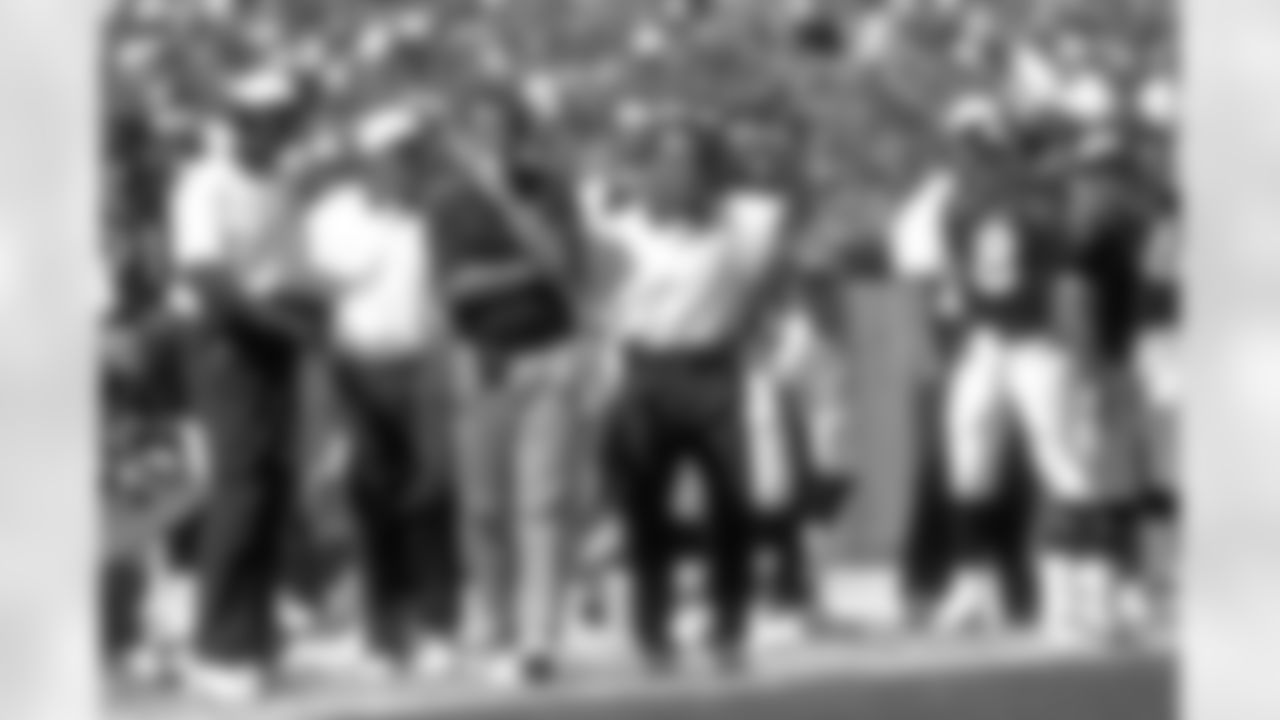ENGLEWOOD, Colo. — Former Broncos offensive line coach Alex Gibbs, whose zone-blocking scheme defined the team's dominant rushing attack during its back-to-back Super Bowl run and for more than a decade in Denver, died from complications from a stroke on Monday, the team announced. Gibbs, who was surrounded by his family at his home in Phoenix, was 80.
Gibbs' thinking and coaching was a key part of the Broncos' Super Bowl XXXII and XXXIII teams, but even more so for how offenses in the NFL have evolved in the decades since he first came into the league in 1984.
"We are deeply saddened by the passing of Alex Gibbs, who had a profound impact on the Denver Broncos and the National Football League as an offensive line coach," the Broncos said in a statement. "During his 14 years with the Broncos, Coach Gibbs left a lasting legacy on this league with his innovative blocking schemes and outstanding teaching ability. He helped the Broncos to Super Bowls during three different decades—including back-to-back World Championships—while forging a reputation as one of the greatest assistant coaches in NFL history.
"Our hearts go out to Alex's wife, Trina, and the entire Gibbs family as well as Alex's many former players and fellow coaches."
Gibbs first arrived in Denver in 1984, hired by head coach Dan Reeves as an offensive line coach after 15 years in the collegiate ranks.
Reeves, head offensive line coach Marvin Bass and Gibbs immediately set out to help the team better protect their quarterbacks, including young star John Elway; the Broncos' QBs as a whole had been sacked 55 times the previous year. In Gibb's first season, that total dropped to just 35 sacks as Denver went 13-3.
But more than that, Gibbs began his to evaluate and install some of his principles that went against the dominant way of thinking about forming an offensive line. Size and strength are important, but could smaller, more athletic linemen do the job even better?
Gibbs, soon promoted to head offensive line coach, would find some success in starting to feel out these new ideas as the Broncos found their first postseason success with Elway leading the way. But his innovative way of thinking wouldn't truly come to fruition until his second stint with the Broncos.
After working for the Raiders, Chargers, Colts and Chiefs in various capacities for seven years, Gibbs returned to Denver in 1995, where he would soon find the perfect combination of offensive linemen and lead running back.
That year, the Broncos struck gold with sixth-round draft pick Terrell Davis emerging as the team's top back. The rookie ran for 1,117 yards and seven touchdowns, showing just a glimpse of what he would be able to accomplish in the years to come with Gibbs' zone-blocking scheme paving the way for him.
And, once again, Gibbs proved magical for keeping Elway upright and his jersey clean. After a 1994 season in which Elway was sacked 46 times (the team gave up 55 total), Gibbs helped cut that number to just 22 (26 total) in 1995.
As Davis continued to prove himself as one of the league's best players, the Broncos reaped the rewards with a dominant offense that powered them to tremendous success.
Flip through photos from innovative offensive line coach Alex Gibbs, whose thinking and scheme helped pave the way for much of the Broncos' success in the trenches.

Alex Gibbs talks over strategy with his players along the sidelines against the Philadelphia Eagles at Mile High Stadium in Denver, CO on October 4, 1998.

Alex Gibbs talks with Mike Shanahan on the sidelines against the New Orleans Saints at Louisiana Superdome in New Orleans, LA on December 3, 2000.

Alex Gibbs watches the team warm up before the first preseason home game of the year against the New Orleans Saints at Mile High Stadium in Denver, CO on August 14, 1998.

Studio portrait of Alex Gibbs.

Offensive line coach Alex Gibbs runs on the field during a December 24, 1995 win (31-28) against the Oakland Raiders.

Alex Gibbs sits in the locker room before the game against the Miami Dolphins at Pro Player Stadium in Miami, FL on December 21, 1998.

Alex Gibbs talks with his players along the sidelines against the Kansas City Chiefs at Mile High Stadium in Denver, CO on December 6, 1998.

Alex Gibbs, John Elway, and Brian Griese chat during halftime against the Jacksonville Jaguars at Mile High Stadium in Denver, CO on October 25, 1998.

Denver Broncos Alex Gibbs and John Elway review game photos in action against the Atlanta Falcons at GA Dome in Atlanta, GA on September 28, 1997.

Alex Gibbs goes over some formations with center Tom Nalen at the halftime break against the Dallas Cowboys at Mile High Stadium in Denver, CO on September 13, 1998.

Kansas City: Coach Alex Gibbs talks with Brian Habib and Harry Swayne on the sideline during the second round playoff game with the Chiefs against the Kansas City Chiefs at Arrowhead Stadium in Kansas City, MO on January 4, 1998.

Denver Broncos consultant Alex Gibbs at the Denver Broncos Offseason Team Activity May 30, 2013.

Denver Broncos Alex Gibbs coaches in the bench area against the Seattle Seahawks at Kingdome in Seattle, WA on September 7, 1997.

Denver Broncos in action against the Kansas City Chiefs at Mile High Stadium in Denver, CO on August 31, 1997.

Offensive consultant Alex Gibbs, right, has an upbeat chat with offensive line coach Dave Magazu during Denver Broncos training camp July 27, 2013.

Alex Gibbs watches the game action from the sidelines against the Oakland Raiders at Invesco Field at Mile High in Denver, CO on September 22, 2003.

Alex Gibbs supervises the drills during the Broncos training camp held up in Greeley, CO.

Alex Gibbs heads off into the locker room at halftime against the San Francisco 49ers at Mile High Stadium in Denver, CO on December 23, 2000.

Alex Gibbs talks with his offensive line against the Seattle Seahawks at Mile High Stadium in Denver, CO on December 10, 2000.

Alex Gibbs talks with his players along the sidelines against the Cincinnati Bengals at Paul Brown Stadium in Cleveland, Ohio on September 7, 2003.

Assistant head coach Alex Gibbs coaches on the sidelines against the Seattle Seahawks at The Kingdome in Seattle, WA on November 26, 2000.

Alex Gibbs talks to his players along the sidelines against the New England Patriots at Mile High Stadium in Denver, CO on October 1, 2000.

Alex Gibbs ponders the next call against the Cleveland Browns at Mile High Stadium in Denver, CO on October 15, 2000.

Alex Gibbs talks with the offensive unit along the sidelines against the Oakland Raiders at Mile High Stadium in Denver, CO on November 13, 2000.

Mike Shanahan goes over the play list with Alex Gibbs against the Oakland Raiders at Network Associates Coliseum in Denver, CO on September 17, 2000.
Denver marched toward yet another Super Bowl appearance after a 12-4 season in 1997, a wild-card team set on revenge against the likes of the Jaguars, Chiefs and Steelers before facing off against the Packers in Super Bowl XXXII. This time, the Broncos relied upon more than just the magic Elway could create. Behind the rushing attack that Gibbs had helped create, Davis powered the Broncos through the playoffs and into a matchup with the defending champs.
Denver was considered the underdog by more than a touchdown, and Gibbs' small but mighty offensive line was considered a potential key weakness by analysts against Green Bay's massive defensive line, led by future Hall of Famer Reggie White.
In a story headlined "Packers defensive line could pose big problems for Broncos’ small line," Wisconsin State Journal reporter Kent Youngblood pointed out the vast differences in size between the two groups. Denver's O-line was "the NFL's smallest offensive line" at "an average of 6-foot-4 and 290 pounds," while Green Bay's defensive line "is the biggest" with "only one starter [that] weighs less than 300 pounds. …
"It's the small and mobile Broncos offensive line vs. the big and immovable Packers defensive front."
Gibbs' tenets proved strong, and the players even stronger. The "immovable Packers defensive front" was moved enough to allow Davis to run for 157 yards and three touchdowns, as he earned Super Bowl MVP honors.
"We just kept quiet and sort of set the trap, you could say," tackle Gary Zimmerman said after the game. "It didn't do any good to get in an argument about it. We just had to wait until Sunday to show them small guys can block big guys."
A year later, Gibbs, Davis and the Broncos' offensive line outdid themselves as Davis ran for 2,008 yards and 21 touchdowns, earning league MVP honors in the process. As the Broncos' led a back-to-back championship run, the unit again proved key for the offense.
"He was perfect for what we wanted," Gibbs told the Athens Banner-Herald in 2020. "He was the best running back for a short period of time that I saw in the league. We were at our peak when he was in the backfield."
In the seasons that followed, the Broncos were unable to reach those heights of team success in the wake of Elway's retirement and injuries to Davis that significantly cut short what would still be a Hall of Fame career.
Regardless, Gibbs' scheme would prove reliable for Denver. In four of the five seasons that Gibbs coached for the Broncos after the 1998 season, the team had a 1,000-yard rusher — Olandis Gary in 1999, Mike Anderson in 2000 and Clinton Portis in 2002-03. Gibbs also later returned to the Broncos as an offensive line consultant in 2013, helping the team reach one more Super Bowl before calling it a career.
As a guru in teaching zone blocking, Gibbs was a key figure in how NFL offenses developed over the past three decades, forming foundational principles for how West Coast offenses have evolved under offensive minds like Mike Shanahan and many others.
Because of that, Gibbs' legacy in the game is unmistakable, and it will live on for decades to come.















